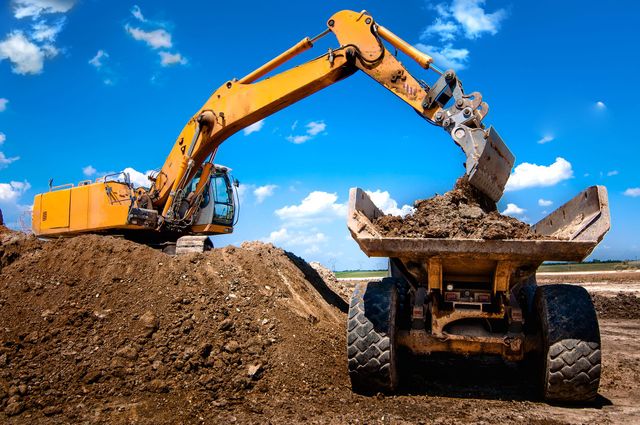Residential Excavating Ohio - Specialized Excavation for Ohio Residences
Residential Excavating Ohio - Specialized Excavation for Ohio Residences
Blog Article
Comprehensive Excavation Techniques: Grasping the Fundamentals for Success
The careful planning, exact implementation, and careful attention to information required in excavation tasks require an extensive strategy that encompasses various essential facets. The real proficiency exists not just in understanding these principles but in effortlessly integrating them to navigate the complexities of excavation jobs with skill.
Understanding Excavation Job Planning

Effective excavation tasks are constructed on the foundation of careful and complete planning. The first stage of any type of excavation job is the drawing board, where vital decisions are made that can significantly influence the outcome of the project. Throughout this phase, it is vital to collect all pertinent details regarding the website, including topographical surveys, dirt structure, and any potential dangers that might exist. Recognizing the project extent, budget, and timeline restraints is important for developing a thorough excavation strategy that ensures the job's success.
One secret aspect of excavation job preparation is the advancement of a detailed timeline that details the sequence of tasks, landmarks, and target dates. This timeline functions as a roadmap for the task group, allowing them to track progression and make needed adjustments to make sure the task stays on routine. Additionally, a distinct spending plan that makes up all costs, consisting of equipment service, labor costs, and products, is crucial for avoiding price overruns and hold-ups. By meticulously taking into consideration all these elements throughout the drawing board, excavation tasks can be performed effectively and properly, leading to successful end results.
Soil Analysis and Site Assessment
Performing comprehensive soil evaluation and site evaluation is a critical step in the prep work phase of any kind of excavation job. Dirt analysis entails figuring out the make-up, structure, and buildings of the dirt at the excavation site. This information is essential for understanding the soil's bearing capability, dampness material, and potential for disintegration, which are crucial aspects in establishing the excavation approaches and equipment required for the task.
Website evaluation goes past dirt evaluation and encompasses a wider assessment of the general website conditions. This assessment includes determining any type of possible risks, such as underground energies, environmental issues, or unstable surface, that might affect the excavation process. By thoroughly evaluating the site, project supervisors can develop reliable excavation approaches that focus on safety, performance, and environmental management.
Making use of innovative innovations like ground-penetrating radar, dirt tasting, and drone surveys can boost the precision and performance of dirt evaluation and website assessment. Investing time and resources in these initial steps can eventually conserve time and stop expensive delays or issues during the excavation procedure.
Tools Choice and Usage
Reliable excavation jobs rely greatly on tactical devices selection and use to guarantee optimum efficiency and efficiency. Selecting the ideal tools for the work is important in taking full advantage of efficiency and minimizing downtime. Elements such as the kind of soil, depth of excavation, and task range play a substantial duty in identifying one of the most ideal equipment for the job available.

Along with picking the appropriate tools, correct utilization is vital to task success. Operators should be trained to deal with the devices securely and effectively - lancaster excavation. Normal upkeep checks and click resources timely repair services help avoid break downs and make certain consistent performance throughout the job
Safety Measures and Rules Conformity
In the world of excavation jobs, focusing on precaution and conformity with guidelines is paramount to making sure a secure and legally audio operational environment. Precaution encompass a variety of techniques, including conducting extensive site assessments, executing correct signs and barriers, and offering sufficient safety training for all workers involved in the excavation procedure. why not find out more Adherence to regulations, such as OSHA needs in the USA, ensures that the excavation project fulfills the necessary criteria to safeguard workers, spectators, and the surrounding environment.

Surveillance Development and Adjusting Methods
Just how can project managers successfully track the improvement of excavation tasks and adjust their approaches accordingly to enhance end results? Tracking progress is essential for making certain that excavation projects remain on track and fulfill due dates. Job supervisors can use numerous tools and strategies to track progress, such as daily progress reports, regular website assessments, and advanced tracking innovations like drones and GPS tracking systems. By continuously keeping an eye on the task's development, supervisors can identify any potential hold-ups or issues early and take aggressive measures to address them.

Final Thought
To conclude, grasping the fundamentals of thorough excavation techniques is vital for the success of any type of job. By comprehending project preparation, assessing dirt and website problems, selecting ideal devices, following security policies, and checking development, task supervisors can ensure a effective and smooth excavation procedure. Applying these strategies will bring about effective results and lessen potential threats or setbacks throughout the excavation task.
The preliminary phase of any type of excavation job is the planning phase, where critical choices are made that can substantially affect the outcome of the task. Comprehending the job timeline, scope, and budget restrictions is crucial for creating a detailed excavation strategy that guarantees the task's success.
Exactly how can project managers effectively track the innovation of excavation projects and adjust their strategies accordingly to optimize outcomes? By carefully checking progress and being ready to adjust methods, project supervisors can improve the overall success of excavation projects.
By understanding project planning, analyzing soil and website problems, selecting proper devices, conforming with safety and security guidelines, and checking progress, project supervisors can ensure a effective and smooth excavation process.
Report this page